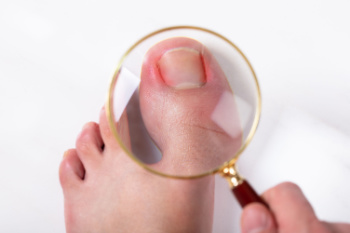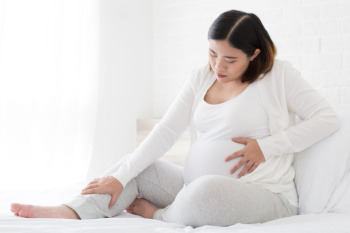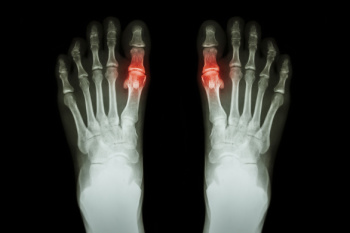
An ingrown toenail, a common foot condition, occurs when the edge of the toenail grows into the surrounding skin, leading to pain, swelling, and discomfort. This condition typically affects the big toe but can occur on any toe. Ingrown toenails can develop due to a variety of factors, including improper nail trimming techniques, wearing tight-fitting shoes, or sustaining toe injuries. Additionally, individuals with curved or unusually shaped toenails may be more prone to ingrown toenails. Symptoms of ingrown toenails include redness, tenderness, and inflammation around the affected nail, as well as the presence of pus or drainage in severe cases. If left untreated, ingrown toenails can become infected, causing further pain and complications. Recognizing the causes and symptoms of ingrown toenails is important for prompt treatment and prevention strategies. If you have developed an ingrown toenail, it is suggested that you contact a podiatrist who can treat this condition, which may include minor surgery for partial or total removal.
Ingrown toenails can become painful if they are not treated properly. For more information about ingrown toenails, contact one of our podiatrists of Lovely Foot Associates, PC. Our doctors can provide the care you need to keep you pain-free and on your feet.
Ingrown Toenails
Ingrown toenails occur when a toenail grows sideways into the bed of the nail, causing pain, swelling, and possibly infection.
Causes
Prevention
Because ingrown toenails are not something found outside of shoe-wearing cultures, going barefoot as often as possible will decrease the likeliness of developing ingrown toenails. Wearing proper fitting shoes and using proper cutting techniques will also help decrease your risk of developing ingrown toenails.
Treatment
Ingrown toenails are a very treatable foot condition. In minor cases, soaking the affected area in salt or antibacterial soaps will not only help with the ingrown nail itself, but also help prevent any infections from occurring. In more severe cases, surgery is an option. In either case, speaking to your podiatrist about this condition will help you get a better understanding of specific treatment options that are right for you.
If you have any questions please feel free to contact our office located in Johnstown, PA . We offer the newest diagnostic and treatment technologies for all your foot and ankle needs.

Pregnancy is marked by numerous changes in the body, including the feet. One notable alteration is the increase in shoe size experienced by many expectant mothers. This change occurs due to hormonal fluctuations and the body's natural tendency to retain fluids, which leads to swelling in the feet and ankles. Consequently, women may find that their usual shoe size feels snug or uncomfortable during pregnancy, necessitating the need for larger footwear to accommodate the swelling. Additionally, some pregnant individuals may encounter itching and redness on the soles of their feet, a condition known as pruritus gravidarum. This symptom can arise due to heightened blood circulation, hormonal changes, or skin stretching, causing discomfort and irritation. While these foot changes are a normal part of pregnancy, expectant mothers need to prioritize foot health by wearing supportive footwear, practicing gentle foot exercises, and elevating the feet to reduce swelling. Consulting with a podiatrist can also guide in managing foot discomfort and ensuring a smooth pregnancy journey. If you are seeking relief from foot conditions developed during pregnancy, it is suggested that you consult a podiatrist.
Pregnant women with swollen feet can be treated with a variety of different methods that are readily available. For more information about other cures for swollen feet during pregnancy, consult with one of our podiatrists from Lovely Foot Associates, PC. Our doctors will attend to all of your foot and ankle needs.
What Foot Problems Can Arise During Pregnancy?
One problem that can occur is overpronation, which occurs when the arch of the foot flattens and tends to roll inward. This can cause pain and discomfort in your heels while you’re walking or even just standing up, trying to support your baby.
Another problem is edema, or swelling in the extremities. This often affects the feet during pregnancy but tends to occur in the later stages.
How Can I Keep My Feet Healthy During Pregnancy?
If you have any questions please feel free to contact our office located in Johnstown, PA . We offer the newest diagnostic and treatment technologies for all your foot and ankle needs.

Gout, a form of arthritis, causes sudden bouts of intense pain, swelling, and redness, primarily in joints like the big toe. It occurs due to the accumulation of urate crystals in the joints, resulting from high levels of uric acid in the blood. Understanding the risk factors of gout unveils various elements that contribute to its onset. Lifestyle choices, such as a diet rich in purines found in red meat and certain seafood, significantly elevate the risk. Additionally, obesity and excessive alcohol consumption increase the likelihood of developing gout. Genetic predispositions also play a pivotal role, as individuals with a family history of gout are more susceptible. By addressing modifiable factors like diet and lifestyle, individuals can lower the risk of gout and its debilitating consequences. Early detection and treatment are critical in alleviating symptoms and enhancing quality of life for those affected by this painful condition. If you have gout, it is strongly suggested that you are under the care of a podiatrist who can help you to manage this condition.
Gout is a foot condition that requires certain treatment and care. If you are seeking treatment, contact one of our podiatrists from Lovely Foot Associates, PC. Our doctors will treat your foot and ankle needs.
What Is Gout?
Gout is a type of arthritis caused by a buildup of uric acid in the bloodstream. It often develops in the foot, especially the big toe area, although it can manifest in other parts of the body as well. Gout can make walking and standing very painful and is especially common in diabetics and the obese.
People typically get gout because of a poor diet. Genetic predisposition is also a factor. The children of parents who have had gout frequently have a chance of developing it themselves.
Gout can easily be identified by redness and inflammation of the big toe and the surrounding areas of the foot. Other symptoms include extreme fatigue, joint pain, and running high fevers. Sometimes corticosteroid drugs can be prescribed to treat gout, but the best way to combat this disease is to get more exercise and eat a better diet.
If you have any questions please feel free to contact our office located in Johnstown, PA . We offer the newest diagnostic and treatment technologies for all your foot and ankle needs.